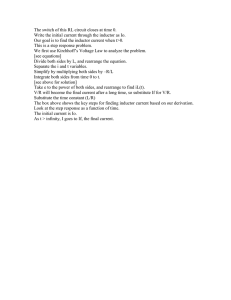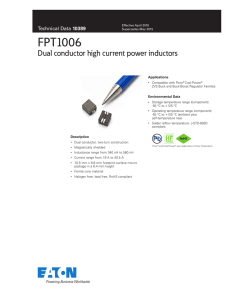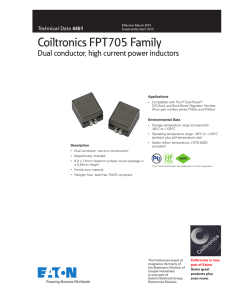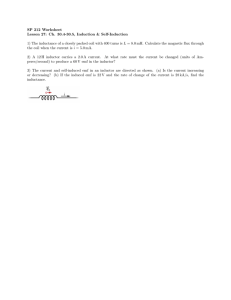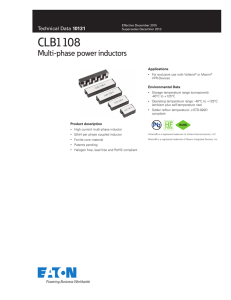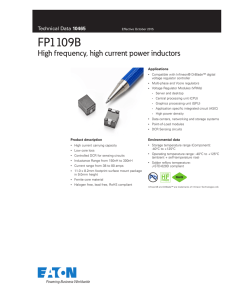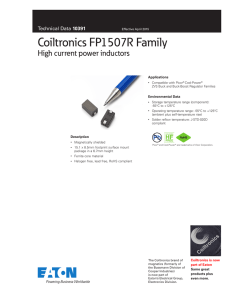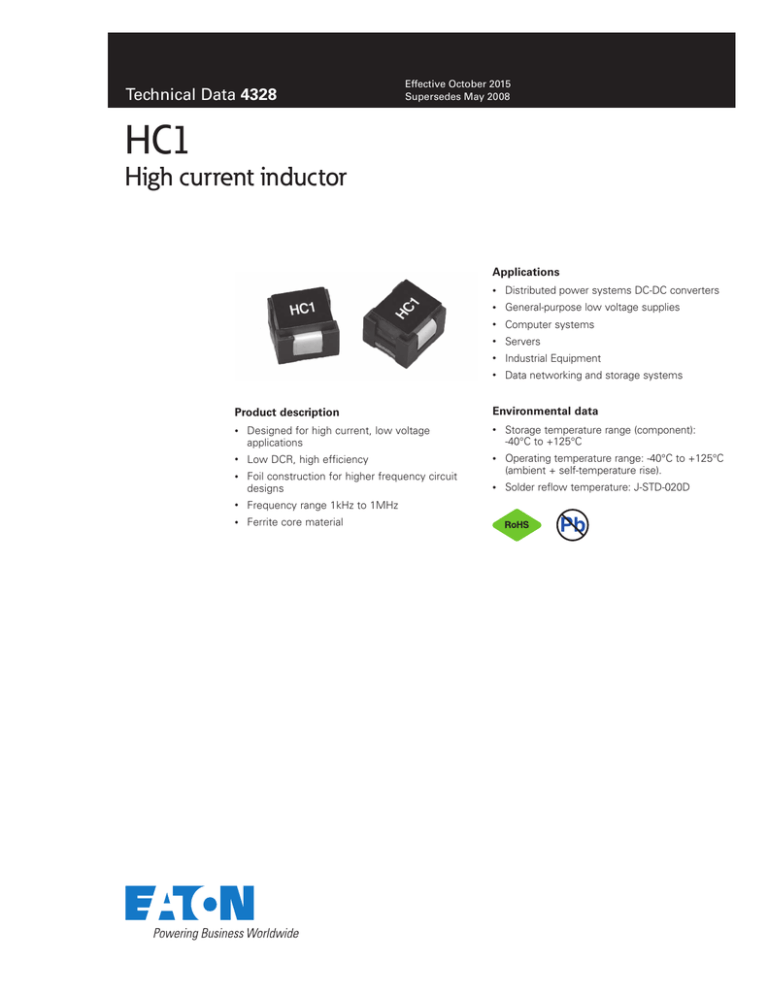
Technical Data 4328
Effective October 2015
Supersedes May 2008
HC1
High current inductor
Applications
Product description
•
Distributed power systems DC-DC converters
•
General-purpose low voltage supplies
•
Computer systems
•
Servers
•
Industrial Equipment
•
Data networking and storage systems
Environmental data
•
Designed for high current, low voltage
applications
•
Storage temperature range (component):
-40°C to +125°C
•
Low DCR, high efficiency
•
•
Foil construction for higher frequency circuit
designs
Operating temperature range: -40°C to +125°C
(ambient + self-temperature rise).
•
Solder reflow temperature: J-STD-020D
•
Frequency range 1kHz to 1MHz
•
Ferrite core material
Pb
HC1
High current inductor
Technical Data 4328
Effective October 2015
Product specifications
Part number
OCL1 (μH) ±15%
lrms2 amps (approx.)
lsat3 amps (approx.)
DCR (Ω) maximum @ 20°C
Volt-μsec4 (V μs) ref.
HC1-R22-R
0.218
51.42
40.5
0.00036
1.83
HC1-R30-R
0.291
51.42
31.8
0.00036
1.83
HC1-R57-R
0.572
37.83
33.4
0.00068
3.66
HC1-R87-R
0.866
28.01
31.0
0.00123
5.49
HC1-1R0-R
1.12
28.01
25.4
0.00123
5.49
HC1-1R7-R
1.66
22.30
22.2
0.0020
7.33
HC1-2R3-R
2.29
22.30
16.7
0.0020
7.33
HC1-3R6-R
3.59
16.76
13.4
0.0035
9.16
HC1-5R1-R
5.15
12.79
11.2
0.0057
10.99
HC1-7R8-R
7.85
12.79
6.7
0.0057
10.99
HC1-100-R
10.5
12.79
5.3
0.0057
10.99
1. OCL (Open Circuit Inductance) Test parameters: 300kHz, .25Vrms, 0.0Adc & Isat.
2.Irms Amps for approximately ΔT of 40°C. DC current for an approximate ΔT of 40°C without
core loss. Derating is necessary for AC currents. It is recommended that the temperature of the part
not exceed 125°C under worst case operating conditions verified in the end application.
3.Isat Amps Peak for approximately 30% rolloff @ 20°C.
4. Applied Volt-Time product (V-μs) across the inductor. This value represents the applied V-μs at 200kHz
necessary to generate a core loss equal to 10% of the total losses for 40°C temperature rise.
See Core Loss Graph.
5. Part number definition - HC1-xxx-R:
HC1 = Product code and size
-xxx = Inductance value
R = Decimal point (if no “R” is present, last character equals number of zeros )
-R Suffix = RoHS compliant
Dimensions–mm
Top View
Side View
Recommended Pad Layout
Front View
4.5
4.5
13.0
Max.
1
10.0
Max.
4.9 Typ.
1
10.0
2
2
14.5
2.2
Typ.
13.0
Max.
Schematic
(Componenet Side)
xxx = Inductance value
wwllyy = Date code R = Revision level
Packaging information (mm)
Supplied in tape and reel packaging, 250 parts per reel, 13” diameter reel.
4.0
1.5 dia
+0.1/-0.0
2.0
1.5 dia
min
A
1.7
1
11.5
HC1-XXX
wwllyyR
13.4
24.0
+/-0.3
2
2.0
10.3
SECTION A-A
20.0
A
13.4
User direction of feed
2
www.eaton.com/elx
HC1
High current inductor
Technical Data 4328
Effective October 2015
Core loss
Irms Derating With Core Loss
0
20
40
50
70
Hz
50
k
100
k
Hz
80
400
k
300 Hz
kH
z
200
kH
z
% of Losses from Irms (maximum)
60
90
92
94
95
96
97
98
99
10
20
30
40
50
60
70
80 90
100
200
300
400
500
600
800
1000
% of Applied Volt-μ-Seconds
www.eaton.com/elx
3
HC1
High current inductor
Technical Data 4328
Effective October 2015
Inductance characteristics
HC1 Inductor (R22, 7R8)
100
100
90
90
80
80
OCL (%)
OCL (%)
HC1 Inductor (R87)
70
70
60
60
50
0
10
20
30
40
50
60
70
80
90
100
110
50
120
0
10
20
30
40
50
% of I sat
100
90
90
80
80
OCL (%)
OCL (%)
100
70
0
10
20
30
40
50
60
70
80
90
100
110
50
120
0
10
20
30
40
50
60
70
% of I sat
% of I sat
HC1 Inductor (R30, 100)
HC1 Inductor (1R0)
100
110
120
80
90
100
110
120
80
90
100
110
120
100
90
90
80
OCL (%)
OCL (%)
90
60
100
70
80
70
60
60
0
10
20
30
40
50
60
% of Isat
4
80
70
60
50
70
HC1 Inductor (R57, 2R3, 3R6, 5R1)
HC1 Inductor (1R7)
50
60
% of I sat
www.eaton.com/elx
70
80
90
100
110
120
50
0
10
20
30
40
50
60
% of I sat
70
HC1
High current inductor
Technical Data 4328
Effective October 2015
Solder reflow profile
TP
TC -5°C
tP
Max. Ramp Up Rate = 3°C/s
Max. Ramp Down Rate = 6°C/s
Temperature
TL
Preheat
A
T smax
t
Table 1 - Standard SnPb Solder (Tc)
Package
Thickness
Volume
mm3
<350
Volume
mm3
≥350
<2.5mm)
235°C
220°C
≥2.5mm
220°C
220°C
Table 2 - Lead (Pb) Free Solder (Tc)
Tsmin
25°C
ts
Time 25°C to Peak
Package
Thickness
Volume
mm3
<350
Volume
mm3
350 - 2000
Volume
mm3
>2000
<1.6mm
260°C
260°C
260°C
1.6 – 2.5mm
260°C
250°C
245°C
>2.5mm
250°C
245°C
245°C
Time
Reference JDEC J-STD-020D
Profile Feature
Standard SnPb Solder
Lead (Pb) Free Solder
• Temperature min. (Tsmin)
100°C
150°C
• Temperature max. (Tsmax)
150°C
200°C
• Time (Tsmin to Tsmax) (ts)
60-120 Seconds
60-120 Seconds
Average ramp up rate Tsmax to Tp
3°C/ Second Max.
3°C/ Second Max.
Liquidous temperature (Tl)
Time at liquidous (tL)
183°C
60-150 Seconds
217°C
60-150 Seconds
Peak package body temperature (TP)*
Table 1
Table 2
Time (tp)** within 5 °C of the specified classification temperature (Tc)
20 Seconds**
30 Seconds**
Average ramp-down rate (Tp to Tsmax)
6°C/ Second Max.
6°C/ Second Max.
Time 25°C to Peak Temperature
6 Minutes Max.
8 Minutes Max.
Preheat and Soak
* Tolerance for peak profile temperature (Tp) is defined as a supplier minimum and a user maximum.
** Tolerance for time at peak profile temperature (tp) is defined as a supplier minimum and a user maximum.
Life Support Policy: Eaton does not authorize the use of any of its products for use in life support devices or systems without the express written
approval of an officer of the Company. Life support systems are devices which support or sustain life, and whose failure to perform, when properly
used in accordance with instructions for use provided in the labeling, can be reasonably expected to result in significant injury to the user.
Eaton reserves the right, without notice, to change design or construction of any products and to discontinue or limit distribution of any products. Eaton also
reserves the right to change or update, without notice, any technical information contained in this bulletin.
Eaton
Electronics Division
1000 Eaton Boulevard
Cleveland, OH 44122
United States
www.eaton.com/elx
© 2015 Eaton
All Rights Reserved
Printed in USA
Publication No. 4328 BU-SB08064
October 2015
Eaton is a registered trademark.
All other trademarks are property
of their respective owners.


